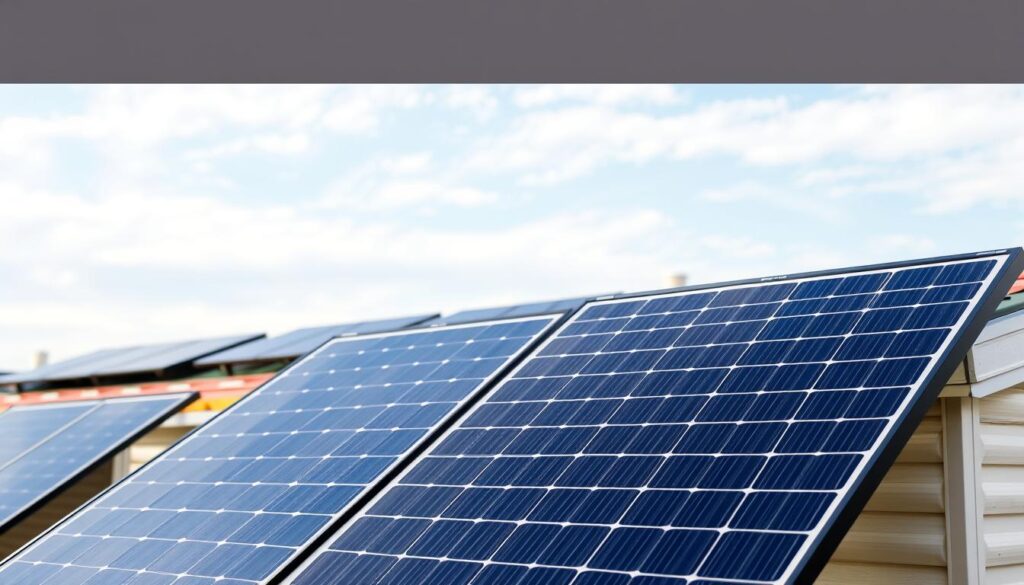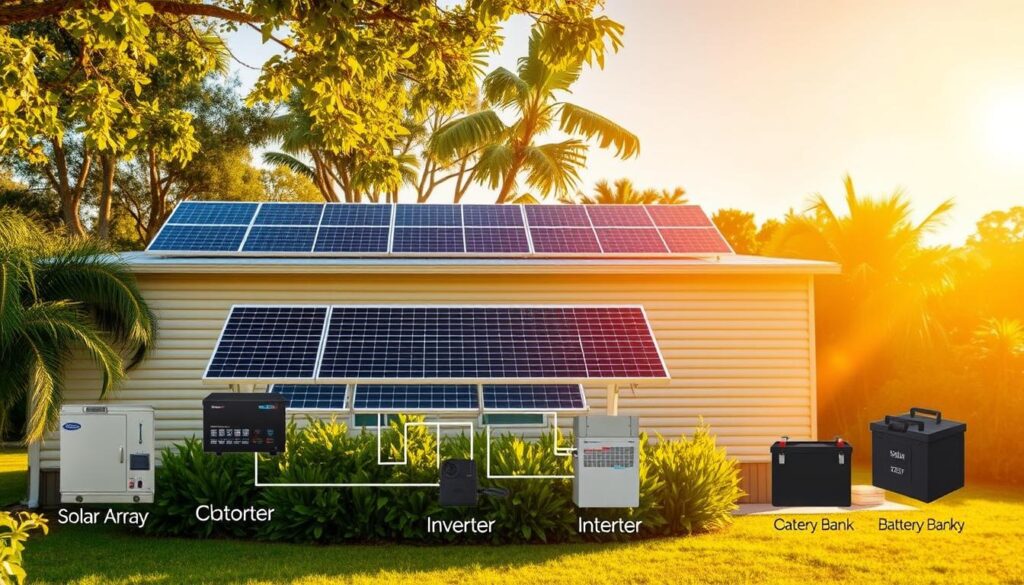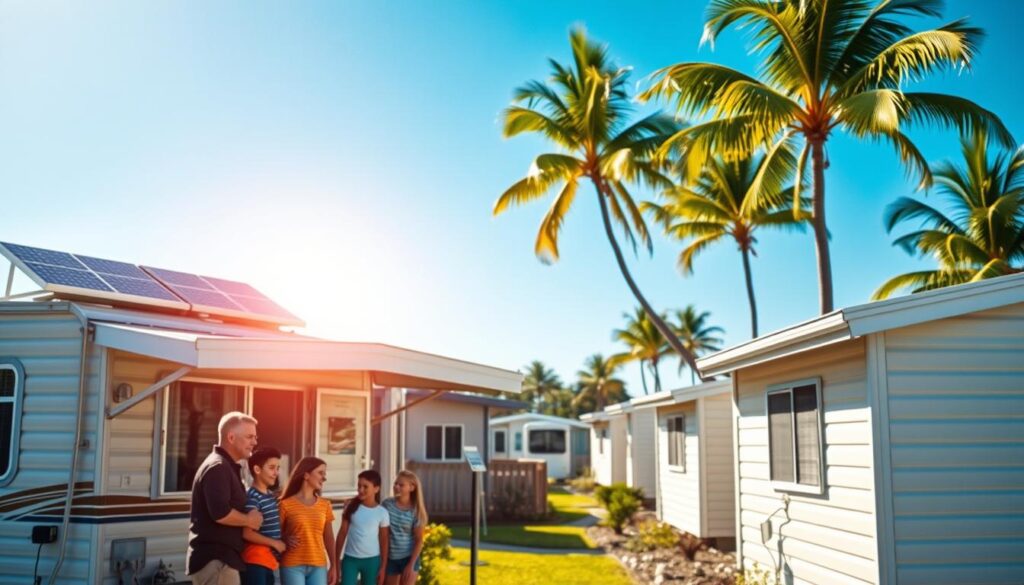Solar panels for mobile homes in Florida offer a smart upgrade for residents seeking reliable energy solutions. With Florida’s sunny climate and rising utility costs, switching to solar provides long-term savings. Mobile Home Energy specializes in tailored installations, ensuring systems fit HUD Code requirements and local regulations. Their no-cost consultations help homeowners assess how solar can cut energy bills and boost independence.
Florida mobile home solar solutions are gaining traction as over 21.2 million Americans live in manufactured homes. In states like Florida, where mobile homes consume about 6 kWh per square foot, solar systems can offset monthly usage. For example, a 400W blender runs 12+ hours on 4.8kWh, while a refrigerator operates 50-80 hours on the same amount. Nature’s Generator Powerhouse systems provide scalable options, from basic setups to platinum configurations.
Key Takeaways
- Solar panels for mobile homes in florida reduce reliance on utility companies and protect against rate hikes.
- Florida’s abundant sunlight makes solar a cost-effective choice for manufactured home communities.
- Mobile Home Energy ensures installations meet HUD Code standards and local building requirements.
- Solar Insure Monitoring & Warranty covers components like inverters and roof penetrations for peace of mind.
- Florida leads in manufactured housing demand, with top shipments in states like Texas and North Carolina.
Why Choose Solar Panels for Mobile Homes?
Florida’s warm climate and abundant sunlight make solar energy for mobile homes in florida a smart choice. With over 230 sunny days yearly, mobile homeowners can harness free energy from the sun. Let’s explore why this option offers more than just savings.
Benefits of Solar Energy
- Florida’s sunny weather boosts panel efficiency, generating clean power year-round.
- Systems qualify for the 30% federal Investment Tax Credit (ITC), reducing upfront costs.
- Modern panels resist hurricane-force winds, ensuring reliability during storms.
| Benefit | Impact |
|---|---|
| Sunshine Availability | 230+ days of annual sunlight |
| Cost Savings | Up to 60% reduction in utility bills |
| Environmental Impact | Reduces carbon footprint by eliminating fossil fuel reliance |
Energy Independence
Storms like hurricanes often cause outages, but affordable solar panels for mobile homes in florida provide backup power. Many systems include batteries that store energy for days, ensuring lights stay on even when the grid fails. Florida’s net metering programs also let you sell unused energy back to utilities.
Cost Savings on Utility Bills
Traditional bills rise 3-5% yearly. Solar flips this script. A 5kW system can cut monthly bills by $150-$200. Over 25 years, that’s thousands in savings. Plus, Florida’s property tax exemptions mean solar won’t increase your home’s assessed value.
“Solar energy gave me control over my energy costs. It’s a game-changer!” – Sarah, a mobile home owner in Naples, FL
With incentives like the federal ITC and state rebates, solar energy for mobile homes in florida becomes an accessible upgrade. Start your journey today and join thousands already enjoying cleaner, cheaper power.
Types of Solar Panels Available
When selecting best solar panels for florida mobile homes, understanding panel types helps match performance to your space and budget. Florida’s climate demands durable, efficient solutions. Let’s explore options tailored to mobile home needs.

Monocrystalline vs. Polycrystalline
Monocrystalline panels, like the Renogy 6pcs Solar Panel Kit, offer 21–23% efficiency and sleek designs. Their high cost suits small roofs. Polycrystalline options, such as the ACROPOWER Solar Kit, provide cost-effective efficiency (20–22%) with blue-tinted aesthetics.
Thin-Film Solar Panels
Flexible panels like the Renogy 175 Watt weigh as little as 5.3 lbs each, ideal for lightweight mobile home roofs. They excel in indirect light but need more space—up to 68 panels for 1,000 sq ft homes.
Bifacial Solar Panels
Bifacial panels, such as Renogy’s bifacial models, capture light from both sides, boosting output by up to 30%. They work best over reflective surfaces like light gravel common in Florida communities.
| Type | Efficiency | Weight | Warranty | Best For |
|---|---|---|---|---|
| Monocrystalline | 20–23% | 13–20 lbs | 10–25 years | Small roofs, high output |
| Polycrystalline | 18–20% | 15–25 lbs | 1–10 years | Budget-friendly setups |
| Thin-Film | 15–17% | 5–7 lbs | 1–5 years | Flexible installations |
| Bifacial | 18–22% | Varies by model | 10–25 years | Reflective surroundings |
Matching your florida solar power options for mobile homes to your home’s size is key. A 600 sq ft home needs 41 panels to meet average daily 5,460 kWh needs. Research warranties and space requirements to find the best fit for your setup.
Key Considerations for Installation
Installing solar panels on your mobile home in Florida requires careful planning. Key factors like roof structure, sunlight exposure, and local laws must be addressed to ensure a safe and efficient mobile home solar panel installation florida. Understanding these considerations helps homeowners avoid costly mistakes and maximize energy benefits.
Roof Compatibility
Roof compatibility is crucial for any mobile home solar system florida. Professionals assess the roof’s load capacity, which must support the added weight of panels—typically 2–4 pounds per square foot. Mobile homes built under HUD codes require specialized inspections to ensure structural safety. Installers check joist spacing and roofing material integrity to prevent long-term damage.
- Roof load capacity (2–4 lbs/sq ft)
- Joist spacing and structural integrity checks
- HU D-code compliance for mobile homes
Orientation and Tilt
Proper panel placement boosts energy output. South-facing roofs are ideal, but east or west orientations can work. Installers adjust tilt angles to 20–30 degrees for optimal sun exposure. Even flat roofs can be adapted with mounting systems to meet Florida’s climate needs.
- South-facing roofs maximize sunlight
- 20–30 degree tilt angle recommended
- Mounting solutions for flat roofs
Local Regulations and Permits
Before installation, secure necessary permits from local authorities. Check HOA rules if applicable. Florida’s net metering policies vary by utility provider, so verify how credits work. Hurricane-resistant materials may be required in coastal areas to meet Florida’s building codes.
- Obtain electrical and building permits
- Confirm HOA approval if needed
- Adhere to net metering policies
- Ensure hurricane-resistant materials
Sizing Your Solar System
Choosing the right solar system size ensures your florida solar panel for off-grid mobile homes meets daily energy demands. Start by reviewing your electricity bills to track monthly usage. The average Florida mobile home uses 500–900 kWh monthly, but specifics vary with appliances and climate needs.

Assessing Power Needs
Calculate your daily energy use first. For example, a 1,000 sq. ft. home using 800 kWh/month needs 14 panels. Use this formula: (Monthly kWh ÷ 162 peak sun hours in Florida) ÷ 400W panel output. A 1,000 sq. ft. home might need 8 panels costing $6,537 post-tax incentives.
Calculating Solar Output
Florida’s 5.5 daily peak sun hours mean each 400W panel produces ~2 kWh daily. A 5kW system (25 panels) generates 100 kWh/day. Use this to match your usage. Example: 2,000 kWh/month requires 34 panels for full coverage.
Choosing the Right Battery Storage
Off-grid setups need batteries. For 1,000 kWh monthly use, 17 panels and 3 lithium-ion batteries (like the GP-LIFEPO4-100) store 2–3 days of power. Compare battery types: lithium lasts longer but costs more than lead-acid.
Installation Process Overview
Choosing between mobile home solar panel installation florida services or tackling the job yourself shapes your experience. Professionals streamline the process, ensuring compliance with local codes and safety standards. Let’s break down the key phases:
DIY Installation vs. Professional Help
- Professional Installers: Handle permitting, engineering, and inspections. They ensure systems meet Florida’s hurricane-resistant standards.
- DIY Approach: Requires self-permitting and expertise in electrical work. Best suited for experienced homeowners.
Step-by-Step Installation Guide
Here’s how the process unfolds:
| Phase | Duration | Details |
|---|---|---|
| Site Survey & Design | 1 week | Assesses roof strength and sun exposure. |
| Permitting | 2–4 weeks | Includes county and HOA approvals. |
| Installation | 1–3 days | Mounting racks, wiring, and inverter setup. |
| Inspection & Activation | 1–2 days | Utility company connects to the grid. |
Safety Precautions to Take
- Use florida mobile home solar solutions rated for high winds and humidity.
- Wear PPE: gloves, safety glasses, and non-conductive tools.
- Shut off power before wiring to avoid electrocution risks.
Proper installation ensures systems last 25+ years. Partnering with certified installers minimizes delays and maximizes efficiency under Florida’s sunny skies.
Costs and Financing Options
Going solar for your mobile home doesn’t mean breaking the bank. affordable solar panels for mobile homes in florida are within reach through smart planning. Let’s break down costs and flexible payment choices to match your budget.

Average Installation Costs in Florida
A 5kW system typically costs $10,000–$20,000. Federal incentives slash this by 30% via the solar tax credit. For example, a $15,000 system drops to $10,500 after tax savings. Florida’s sales tax exemption also saves an extra 6%, making florida solar power options for mobile homes more budget-friendly.
Incentives and Rebates Available
- Florida’s solar tax exemptions keep property taxes unchanged despite system value.
- Utilities like Florida Keys Electric Cooperative offer up to $35,000 in loans.
- Programs like the Dunedin Solar Grant give $2,500 for larger systems.
Financing Plans and Options
Spread payments over time with PACE loans (up to 25 years) or low-interest loans from Suncoast Credit Union. Veterans and homeowners with credit scores as low as 500 qualify for SELF’s crowdfunding loans. Many providers even let you swap your electric bill for a lower solar payment starting day one.
Maintenance and Care for Solar Panels
Regular upkeep ensures your solar energy for mobile homes in florida stays efficient. Florida’s climate requires proactive steps to handle salt residue, humidity, and storm damage. Follow these steps to protect your investment:
Regular Cleaning Recommendations
- Clean panels twice yearly or quarterly in coastal areas.
- Use soft brushes and water—no harsh chemicals.
- Check for salt buildup monthly in beach communities.
Monitoring Performance
Track energy output using software tools. Sudden drops may signal shading from trees or debris. Florida residents should inspect systems post-storms for cracks or loose connections. Inverters should stay cool—place them in shaded spots to avoid overheating.
Troubleshooting Common Issues
| Issue | Solution | Cost Range |
|---|---|---|
| Dirt/debris buildup | Manual cleaning | $50–$100 per session |
| Inverter errors | Professional inspection | $200–$400 |
| Water damage | Check flashing and seals | $150–$300 (annual inspection) |
Florida Power Services advises annual inspections to catch issues early. Their 17+ years of experience ensure repairs for defects are free under warranty terms. Avoid voiding warranties by following manufacturer guidelines. Prioritize maintenance to keep your mobile home solar system florida operating at peak performance for 25–30 years.
Impact of Florida’s Climate on Solar Panels
Florida’s climate creates both opportunities and challenges for solar panels for mobile homes in Florida. With over 230 sunny days annually, the state ranks third nationally for solar potential. This sunlight makes even small systems highly productive, but heat, humidity, and storms require tailored Florida mobile home solar solutions.
Residents in the Hunters Point community reported little to no damage during Hurricanes Helene and Milton, with solar power and battery storage keeping the lights on.
Modern systems address Florida’s extremes. Reinforced mounts rated for 150+ mph winds outperform basic codes, while marine-grade hardware resists salt corrosion near coastlines. Air gaps beneath panels also reduce heat-induced efficiency loss by up to 15%.
- Storm Resilience: Non-penetrating mounts secure panels during hurricanes, tested to withstand Category 4 winds.
- Humidity Protection: Sealed junction boxes and stainless steel hardware prevent moisture damage.
- Temperature Control: Elevated panel spacing cools roofs, cutting AC use by 3-5%—a bonus in Florida’s heat.
Properly installed florida mobile home solar solutions turn climate challenges into advantages. The 31 completed homes at Hunters Point prove this: their hurricane-proof systems kept power flowing even as Hurricane Milton caused outages for 2.5 million others. Prioritizing durability ensures panels thrive under Florida’s unique conditions.
Case Studies: Mobile Homeowners in Florida
Florida mobile homeowners are discovering the benefits of best solar panels for florida mobile homes through real-world success stories. Take Maria Rodriguez, who installed a 4.8kW system on her Zephyrhills home. Her electric bill dropped from $180 to $35 monthly, and during Hurricane Ian, her battery backup kept essentials running. “It was so liberating to find an affordable energy option,” says Richard from Palm Desert, echoing Maria’s experience.
“Knowing my energy costs are stable gives me peace of mind.” — Sarasota resident
Communities like Palmetto Pines saw 40% of residents adopt solar through group discounts, saving $1,200 annually. Challenges remain, like HOA hurdles faced by the Thompsons. They used Florida’s solar access laws to install florida solar panel for off-grid mobile homes, later inspiring HOA policy changes. Over 47% of mobile homes rely solely on electricity, making solar a natural fit.
- Maria’s system cut bills by 80% with hurricane resilience
- Palmetto Pines residents saved 15% via group pricing
- IRS tax credits (ITC/PTC) reduced upfront costs for 2023 installations
The Inflation Reduction Act’s 2024 Solar for All program offers up to $400 million for low-income communities. Programs like PSEC’s heat pump rebates (up to $400 per ton) are already cutting costs. Over 20 million Americans live in mobile homes, and 44% of retrofitted homes recoup costs within 5-10 years. These case studies prove solar isn’t just a trend—it’s a tested solution for Florida’s unique housing needs.
Future of Solar Energy in Florida
Florida’s mobile home solar panel installation florida sector is poised for major growth as innovations and policies reshape the energy landscape. With over 12 gigawatts of solar capacity installed statewide in 2024, Florida ranks second nationally, trailing only California. This momentum is fueling advancements tailored to mobile home solar system florida needs, from lightweight panels to community programs.
Trends in Mobile Home Solar Technology
New technologies like bifacial panels and integrated roofing systems are addressing space constraints. Florida Power & Light’s 30-by-30 initiative aims to install 30 million panels by 2030, boosting accessibility. Battery storage costs dropping 40-60% by 2030 will make backup power affordable for more residents during hurricanes or outages.
Policy Changes and Their Impacts
Florida’s net metering policies remain a focal point. While debates over compensation rates continue, the Public Service Commission is simplifying permits for mobile home installations. Homeowners can still claim federal tax credits, though Florida’s lack of a Renewable Portfolio Standard means progress depends on market demand and local incentives.
The Growing Solar Market in Florida
Florida’s solar market added thousands of jobs and saw mobile home installations grow 200% in five years. Tampa Electric’s Sun Select program now offers 25-100% energy offset options. By 2030, up to 40% of mobile homes could adopt solar, driven by programs like community solar farms in parks where individual installations aren’t feasible.
